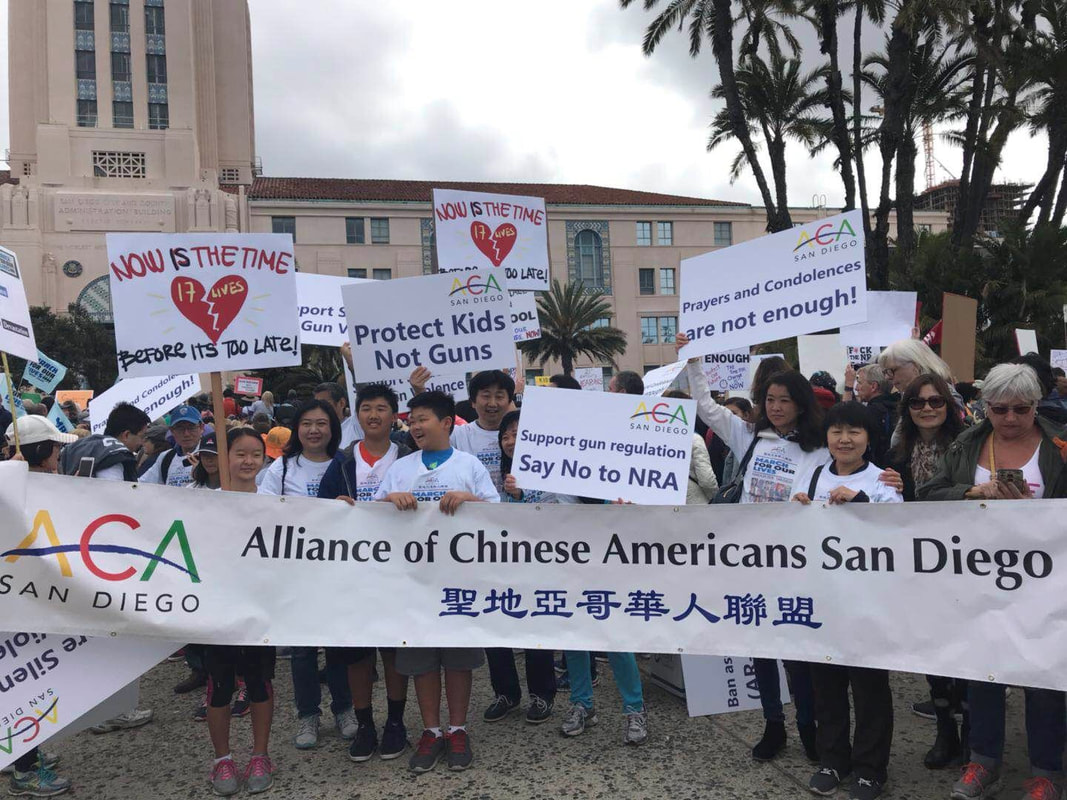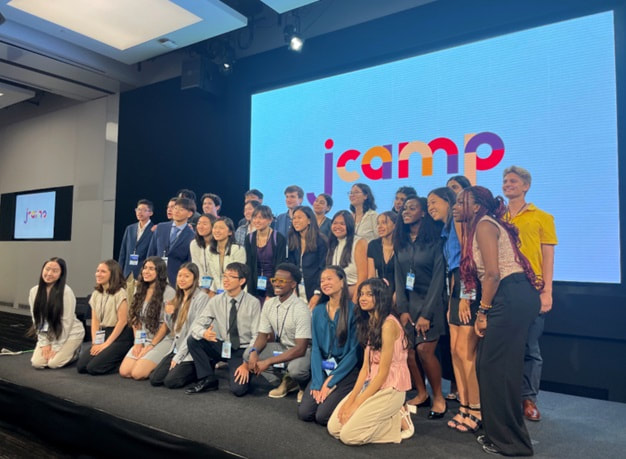|
Sydney Chan (Editor's note: Sydney Chan is a senior at The Bishop's School. Sydney was a recipient of Scholarship for API Student Internship 2023 for API Student Journalism Internship. This is one of the three articles she wrote for the program) JCamp students smile for a group photo following a Washington Post panel. JCampers had the opportunity to ask questions and engage with many of the nation’s top journalists and media executives over their six-days, ranging from breaking news reporters to producers to even white House correspondents. (Photo by Sydney Chan) “I had no idea how much JCamp would change my life,” Bay Area native Xamara Carrillo said. By description, JCamp is a six-day rigorous scholarship journalism program sponsored by the Asian American Journalists Association; but in reality, it’s so much more than that. From intriguing reporting assignments and behind-the-scenes opportunities to awe-inspiring speakers and panelists to life-long connections with some of the nation’s top reporters and fellow budding journalists, JCamp is not only a once-in-a-lifetime experience, but a family.
Students travel from across the country and arrive at the host university’s campus throughout the day on Saturday. This year, the program was held at American University, a gorgeous campus just about twenty minutes from the National Mall in Washington D.C. Following a fun ice-breaker activity on Saturday night and a good night’s rest, students awoke early on Sunday morning, July 16, for their opening full day of camp. After their first daily News Quiz, the young journalists prepped for their first assignment: scouting a story in D.C. and either producing a broadcast report or writing an article on their discovered subject. Los Angeles native Dylan Graff’s favorite activity was the man-on-the-street interviews. “It wasn’t always easy, and there were moments where it bordered on being uncomfortable. [But] ultimately, I believe that it is important to put myself in situations where I’m not necessarily comfortable because it helped me grow as both a journalist and as a person.” Every activity that the students participated in, from anchoring a newscast to broadcasting breaking news, stretched their skills and willingness to grow. Anhui, China native Elsa Qin moved to Walnut, California in middle school. She loved visiting the WUSA9 (a local D.C. affiliate to CBS) studio during camp. “We all got to see broadcasting on the TV happening right before our eyes. It [was] really eye opening standing in a real broadcasting station [and] made me feel like I [could] actually see myself going into a job like that.” Throughout the week, JCampers also had the opportunity to listen and ask questions to some of the nation’s best journalists. While at the studio, campers had the opportunity to speak with News Content Director Caridad Hernandez, WUSA-TV News Producer Jeff Ackermann, Freelance Sports Anchor/Reporter/Host/Analyst Melissa Kim, and WUSA9 Reporter Matthew Torres. On Monday, students took the metro to the Washington Post, where Deputy Politics Editor Brianna Tucker, Campaign Reporter Dylan Wells, Director of Next Generation Audiences Phoebe Connelly, and Audience and Engagement Editor at Next Generation Audience Kanyakrit “Yu” Vongkiatkajorn shared the ins and outs of their work at such a prominent publication. Other speakers included a political journalism panel consisting of Policy Managing Editor at Politico Clea Benson, White House Reporter for the Associated Press Seung Min Kim and Multi-Platform Reporter for NPR Ximena Bustillo; Pulitzer Prize-winning author and correspondent Wes Lowery; and Veteran Broadcast Journalist Joie Chen; among many others. Carrillo loved the political panel, since she felt she took a lot away from the speakers. “I’ve never really looked in[to] politics writing, so I was intrigued and learned a lot.” Graff really enjoyed hearing from Joie Chen. “She had a lot of great stories that helped me better understand what it would be like to work in journalism as someone who is Asian American. She was very open and honest with us, and I really appreciated that.” The JCamp experience wouldn’t be complete without the close relationships students formed with each other as well as the incredible camp directors and faculty. The JCamp Directors were Arelis Hernandez (JCamp Class of ‘04; a Texas-based national corresponded for the Washington Post and the first JCamp graduate to serve as both faculty and co-director), Ben Bartenstein (JCamp Class of ‘11 and a Dubai-based Middle East correspondent for Bloomberg News), Timmy Huynh (JCamp Class of ‘05 and an operations manager and photo editor at the Wall Street Journal), and Julia M. Chan (JCamp Class of ’03 and a producer for CNN’s Special Projects unit). The JCamp faculty were Terrell Brown (JCamp Class of ‘02 and an anchor of on ABC7 morning and midday newscasts), Paul Cheung (the CEO of the Center for Public Integrity in Washington), Neal Justin (an entertainment critic for the Minneapolis Star Tribune who mainly covers TV, radio, and stand-up comedy), and Aimee Cho (JCamp Class of ‘11 and a general assignment reporter for News4 in Washington, D.C.). Qin first learned about JCamp because she grew up watching ABC and “was a small fan of Terrrell Brown;” she said she made the strongest connections with Brown and Hernandez. “They are super chill and easy going, so I sat with them a lot during lunch and just had fun and chatted. It’s [really] cool to realize that [not only are] they are super easy to get along with, [but] they are professional journalists who are accomplished within the field already.” Graff’s closest friend during the camp was his fellow student, Mintesinot Sturm from St. Paul, Minnesota. “I remember we met at the airport and spent the whole car ride to campus just talking about what we were excited to do during the week. When we got back to the dorms, we found out we were going to be roommates.” “A response to the [journalism] industry’s diversity crisis,” JCamp’s official website writes, “the program is designed to assure excellence in the profession for decades to come and to confront the lack of diversity in journalism, not just in race, but also in matters of religious background, political background and other factors.” Carrillo applied to JCamp because she loves journalism but also because diversity in the media is very important to her. “As a member of the Latinx community, I never see enough representation and that’s why I felt so passionate about applying to JCamp,” she said. “Seeing them value diversity really encouraged me to apply.” Graff said, “Whether it be talking with a biracial water polo player about his journey to the Tokyo Olympics or to my grandparents about their experiences in Japanese American incarceration camps, my favorite articles to write have always been the ones tied closely to my identity. JCamp spoke to me.” The program concludes with the AAJA National Convention and an All-Star Reception where the students are able to speak with other brilliant journalists and past JCampers. Since its debut in 2001, over 700 students have graduated and joined JCamp’s brilliant alumni network. The program is completely free to apply to and covers travel, dorm housing, and meals for the 30 students selected from the pool of over 450 applicants. “I would 1000% recommend JCamp to anyone who is interested in journalism, media, or radio [and] will never stop recommending [it]. It’s a program that changes your life, supports you, and [helps you] makes friendships that will last a lifetime,” Carrillo said. “I am forever grateful for everything and everyone.”
0 Comments
Leave a Reply. |


